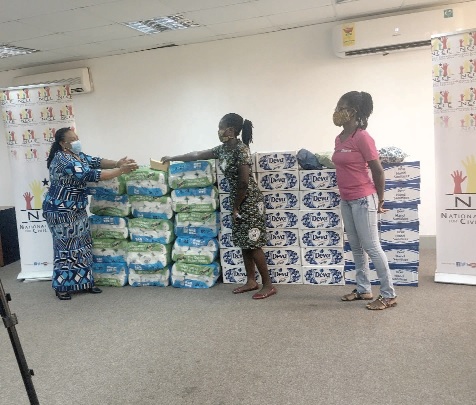
COVID-19: CAMFED Association supports vulnerable group
The emergence and spread of the COVID-19 has led to varied measures to contain it. One of the early measures taken to stem its spread was the country-wide closure of schools.
As an international non-profit organisation that works to eradicate poverty and inequalities through girls’ education and young women empowerment, the Campaign for Female Education (CAMFED) and the CAMFED Association, a network of women leaders educated with CAMFED support deeply concerned about developments in, especially, the education sector, are acting to redress challenges
Advertisement
CAMFED Association
With a membership of 32,745 young women in Ghana and 157,005 across sub-Saharan Africa, the association is a peer support network which provides leadership and entrepreneurship training through which young women return to schools and communities to support more girls to learn, thrive and lead change.
Members of the CAMFED association support vulnerable groups and communities and enable children to remain in school by providing material assistance and mentoring. Members also train other young people in key areas such as reproductive health, financial literacy, business skills, women and children’s rights and advocacy for change.
The CAMFED association is operational in 31 districts of the Northern, North East, Savanna, Upper East, Upper West and Central regions and has chapters in Accra, Kumasi, Takoradi, Obuasi, Techiman and Bolgatanga.
Support to communities
The association has since the outbreak of COVID-19 in the country undertaken a number of interventions to stay responsive to individuals, vulnerable groups and families in the communities to which it holds itself accountable.
One of the key intervention is the translation of COVID-19 prevention messages into two local languages, Dagabani and Moal to support advocacy in the communities. Efforts are underway to record more local translations for use in other rural communities.
CAMFED association members are also working with 33 radio stations across 28 districts to undertake radio sensitisation on the pandemic.
Association members are undertaking the advocacy in partnership with district level officials of the Ghana Health Service (GHS), the Ghana Education Service (GES), the Department of Social Welfare and the National Commission for Civic Education (NCCE).
They will also deliver a life skills curriculum to support children’s learning and build their confidence while they are out of the classroom, ensuring that they understand their rights, the importance of education, learn how to set goals, and how to achieve them.
In partnership with the Information Services Department (ISD) and the NCCE, CAMFED association members are conducting community outreach activities on the pandemic by using information vans and megaphones to reach the most remote communities without radio stations.
Donations
The CAMFED association has also donated Veronica buckets and liquid soaps to the Tamale Children’s Home and also liquid soap and nose masks to the Savelugu Hospital.??? In the Tamale and Sagnarigu districts.???
Members also donated soaps to households in four communities to promote personal hygiene practices.
The CAMFED Association has also supported the NCCE with a donation of personal protective materials such as hand washing liquid soap, sanitisers, nose masks and tissues to enhance the safety of NCCE officials in the discharge of their duties.
Though the challenges of COVID-19 are far-reaching and varied, the CAMFED association sees the difficult times we find ourselves in as an opportunity to test the agility and adaptability of its members in supporting communities across the country.
Challenges
The association sees the challenges faced in the education sector, following school closures as an opportunity to further strengthen partnerships with the GES in districts to explore innovative ways of teaching and learning, with minimal disruptions to the academic calendar.
Investment in young women’s leadership and livelihoods will help communities cope with the social and economic effects of the COVID-19.
Members are working to strengthen grassroots partnerships with community champions, including traditional authorities to help minimise the impact of the crisis on individuals, vulnerable groups and communities.
by Rashida Iddisaly Head of Programmes CAMFED GHANA




